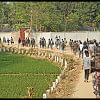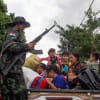Our understanding about Myanmar is limited

In my opinion, our understanding of the world, including our neighbours, is limited. We only focus inward. This limits our knowledge of international and regional dynamics. Our diplomatic engagement often remains transactional, lacking nuance and depth. Consequently, facing crises like the one in Myanmar, we find ourselves hesitant and ill-prepared.
Neither the Rohingya issue nor the recent developments happened overnight; they have a history.
One crucial layer of Myanmar's problems has persisted since its independence: the ethnic/racial dilemma. Myanmar opted for a centralised government instead of a federal structure, which fuelled tensions and violent conflicts across the nation. This explains the ongoing insurgencies within the country. Myanmar has been experiencing a low-intensity insurgency since 1948. This coexisted with a degree of tacit acceptance and established a modus operandi, with the government recognising the presence of various armed groups in different areas. But now, the dynamic has changed.
Following the democratic process initiated in 2010-11, aspirations for growth and prosperity became widespread, particularly among the Bamars. During my visits to Myanmar around 2015-2016, and in 2020, I saw a clear increase in affluence. This new generation developed aspirations for further economic advancement.
Naturally, the military takeover in 2021 triggered widespread protests demanding participation, democracy, and respect for rights. These demonstrations gave rise to the National Unity Government (NUG) and the People's Defence Force (PDF). Many PDF members received training from existing ethnic armed groups, further complicating the situation. This culminated in a joint military campaign launched by different ethnic groups in October last year, exerting significant pressure on the Myanmar military.
Has Bangladesh thoroughly researched and analysed the Myanmar situation? To my knowledge, Bangladesh lacks dedicated institutions for in-depth research on such critical international and sub-regional events, unlike other countries. This lack of research culture hinders our ability to fully comprehend complex geopolitical events.
Furthermore, neglecting the influence of sub-national entities like the Arakan government and the historic connections of ethnic groups now residing in both Myanmar and Bangladesh creates a blind spot in our understanding of the conflict's deeper roots and potential spillover effects on the country's security.
Our current approach of "institutional diplomacy" relies solely on government-to-government and state-to-state communication, potentially limiting our understanding and ability to respond effectively. The current situation involves three distinct levels of complexity: national (Naypyidaw), regional (Arakan and such), and the Rohingya issue. Bangladesh cannot count on simply sending a protest note to Naypyidaw to address the issue when its central government itself holds little control over different regions of Myanmar.
The recent increase in armed group activities and civilian and non-civilian movements across our borders cannot be solved merely through a military approach. During conflicts around the borders of Vietnam-Laos, Laos-Cambodia, or Pakistan-Afghanistan, there were cross-border movements, and such movements are largely inevitable.
Therefore, it's crucial for us to take initiatives to facilitate a ceasefire in Myanmar. Regardless of the specific form or outcome, achieving a ceasefire might mitigate the emerging complexities within Bangladesh. While I acknowledge our limitations in addressing this issue alone, I believe we should collaborate with those currently possessing the necessary capacity. China's involvement with the Shan and Kachin states demonstrates a potential precedent. Perhaps similar engagement with the Arakan Army, leveraging China's unique influence, could facilitate a ceasefire. This would be key to overcoming the immediate crisis. Discussions on Rohingya repatriation and other long-term solutions can then follow.
M Humayun Kabir, a former diplomat, is president of Bangladesh Enterprise Institute (BEI).
Views expressed in this article are the author's own.
Follow The Daily Star Opinion on Facebook for the latest opinions, commentaries and analyses by experts and professionals. To contribute your article or letter to The Daily Star Opinion, see our guidelines for submission.

 For all latest news, follow The Daily Star's Google News channel.
For all latest news, follow The Daily Star's Google News channel. 







Comments